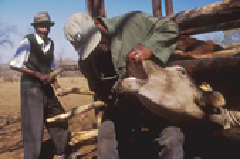
Recognizing the public health significance of M. bovis infection in people and livestock, the World Health Organization (WHO) in collaboration with The Union convened a consultation on zoonotic tuberculosis (TB) in Geneva, from 14-15 April.
The meeting brought together representatives from both human and animal health sectors, including key international organizations for animal health - the Food and Agriculture Organization of the United Nations (FAO) and the World Organisation for Animal Health (OIE). The group reviewed the human and animal TB situation worldwide, discussed the zoonotic aspects of M. bovis infection, and identified areas for further research and intersectoral collaboration. Key actions were formulated to combat zoonotic TB in the context of the WHO End TB Strategy, which will be presented at the meeting of WHO’s Strategic and Technical Advisory Group for TB (STAG-TB) in June 2016. These actions will be developed into a comprehensive Roadmap for zoonotic TB, which will be launched in early 2017.
“If we are serious about ending TB we must intensify action in all sectors. Combating all forms of TB means combating zoonotic TB too”, said Dr Mario Raviglione, Director of the WHO Global TB Programme. “The consultation, the first in over 20 years, is the first step in this direction, and the Roadmap will outline clear actions governments and partners in both the human and animal health sector must take to tackle this threat.”
In 2014, WHO estimated that around 120 000 people fell ill with zoonotic TB. Zoonotic TB is mainly caused by M. bovis, also called bovine TB. TB caused by M. bovis often affects sites other than the lungs (extra-pulmonary) and is naturally resistant to one of the main first-line drugs (pyrazinamide), but in many cases is clinically indistinguishable from M. tuberculosis infection. The most common route for transmission of bovine TB to humans is through the consumption of unpasteurized milk and dairy products. In many developed countries, eradication programs have reduced or eliminated TB in cattle, and human disease is now rare; however, reservoirs in wildlife can make complete eradication difficult. Bovine TB is still common in less developed countries, affecting some populations at risk. It can cause major economic losses from livestock deaths, chronic disease and trade restrictions in these settings.
“The Union, whose Zoonotic TB Sub-section began an intensive effort a year ago to raise awareness of the issue, is now engaging with WHO and other key partners in efforts to address its burden”, said Dr Paula Fujiwara, Scientific Director at The Union. “Our Zoonotic TB Sub-Section, which is a global network of physicians, veterinarians, researchers, economists and social anthropologists, is working to better understand the dynamics of zoonotic TB and foster global action”.
